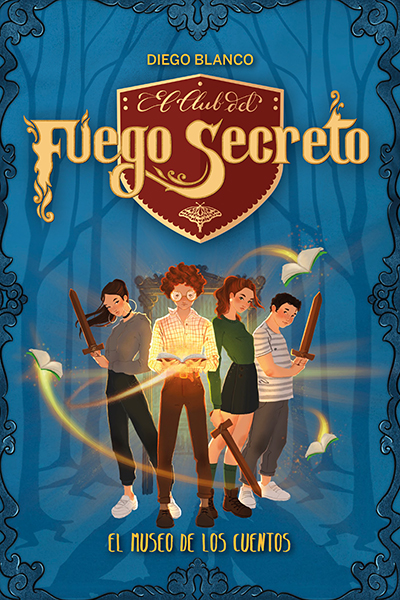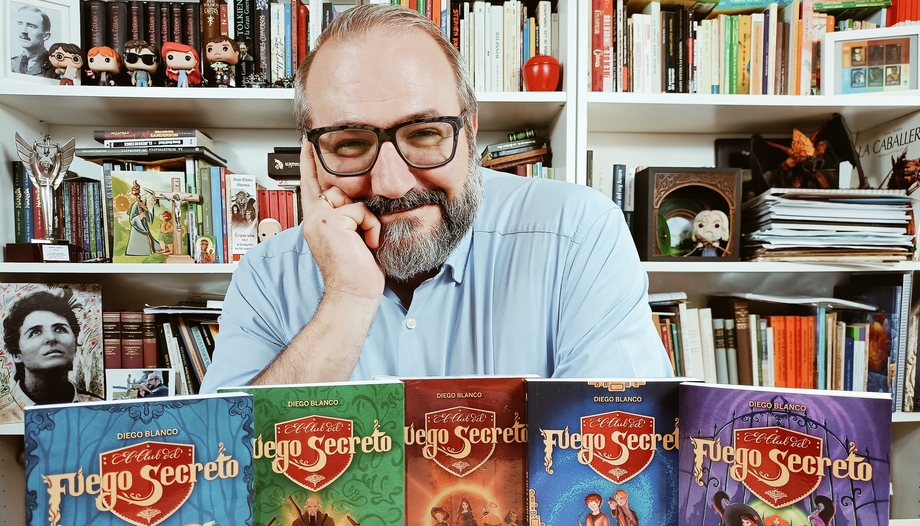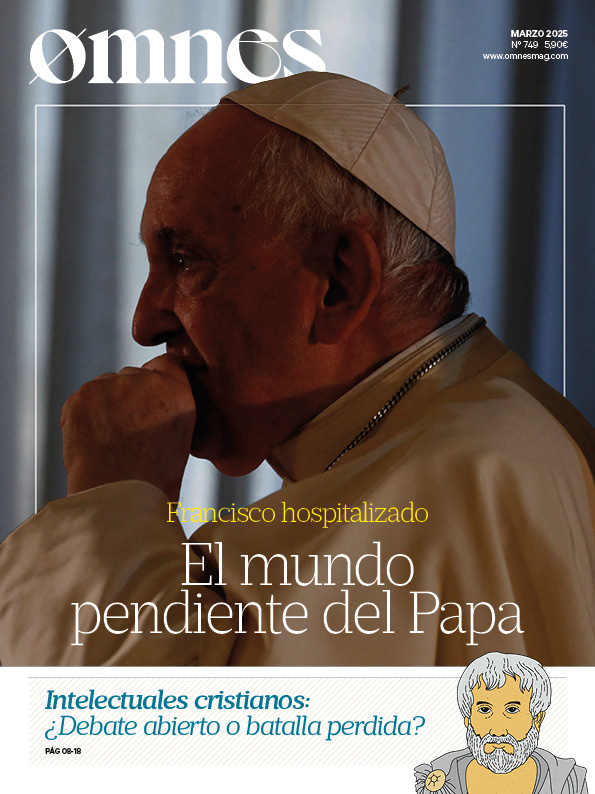Diego Blanco is a cultural researcher, scriptwriter and TV producer. He has published with Ediciones Encuentro "An unexpected path" (2016), "Once upon a time the Gospel in stories" (2020) y "The Secret Fire Club", a 7-book children's saga that concluded in June 2023.
The Secret Fire Club

In this interview with Omnes, he talks about "Secret Fire", the deconstruction and founding of the Tolkien Catholic Association.
How did the idea of the Catholic Tolkien Association come about?
-I was worried about the appearance of the series "The Rings of Power", because I sensed before it came out, from the information that was available, what it was going to be about and that it had very little to do with Tolkien. When it was released, my worst fears were confirmed. Then I was invited by Antonio Izquierdo, a very Tolkienian priest, to his parish in Móstoles, San José Obrero, to make a review of the whole series. That day, I explained why I thought that production was so bad. It is a video that is in Youtube.
At the end of that talk, I announced that I was going to create the Catholic Tolkien Association. I did not know how, as Frodo says, but I was going to create it, because I saw the need to preserve the Catholic legacy of Tolkien's work, which is beginning to be endangered. It is no longer just that some may deny it or pay less attention to it, but it is beginning to be endangered by the "woke" deconstruction, which is an issue that worries me a lot and also has to do with the origin of "The Secret Fire Club".
So I decided to create the ATC to preserve Tolkien's Catholic legacy. They immediately signed up PaulJoaquín, and the priest who had invited me to the talk, the four horsemen of the Apocalypse. People of all kinds are coming, which is something that attracts my attention, and it is being a very nice experience, of communion also with the other founders. And we are having a great time, which is also important. There are different people with different opinions, and what has been shown is the "catholicity" that Tolkien can do, which for me has always been an important thing: that Tolkien unites. And that union is above the fact that there are different sensibilities, which are secondary, at the end of the day, because the important thing is that we are interested in this work because in one way or another it has impacted our lives.
Interesting in that sense is Tolkien's concept of applicability, that he does not intentionally seek an allegory, and is therefore an author who can reach people of very different sensibilities and beliefs.
-That is fundamental, of course it is. That it is applicable is a right that cannot be denied to anyone, because it is a right given by the author, it is sacred. The first one to make an application is me. I never say in my book ("Un camino inesperado") that I make an allegory, it is an accusation made by those who have not read me. In the prologue I say: "This is a Christian application". "An" application, does not mean that it is "the" application. But I say: I think, in my own way, I am getting Tolkien's meaning right. I'm willing to be wrong, because what I want is to learn, but with the data I have, I think that's the meaning. It's one thing if it's applicable, and another if it doesn't mean anything. Because many times, when we talk about applicability, deep down we deny the sense, the meaning.
That's not to say that Moria is Abraham's Moria or that Aragorn has to be anything specific. The important thing with ATC is to have an environment where no one feels stupid for believing that Tolkien's works have helped them in their faith. There are a lot of us whose faith has been helped by Tolkien's works, and there is a reason for that. "The Lord of the Rings" is a fundamentally religious and Catholic work (Tolkien says so in his letter to Murray), it has helped us in our faith and from there we talk, study, write articles... The question is to study him as a Catholic, which is what they have not allowed us to do, because they consider it a circumstantial thing. But in Tolkien it is central. That is a little bit the intention.
From there, we will be able to sit down and talk, which is the beauty of it, and let everyone give their opinion. It is a matter of bringing together the different sensibilities within the association. In what is essential, unity, in what is secondary, freedom, and in everything, charity, as Saint Augustine used to say. And the truth is that it is working very well, in that sense I feel very happy. We have also met people who are eager to know, because they know very little about Tolkien. Which is something that has surprised us, because we thought that only guys as "freaks" as us would join an association, but no, they are Christians who have been helped by Tolkien's work to understand themselves and want to know more.
How did the "deconstruction" affect the origin of the Secret Fire saga?
-Because all that deconstruction of tales and stories, when I got to Tolkien himself, touched my spinal cord, because Tolkien is the starting point of practically all my vital, human and Christian experience. "Secret Fire" is a response. I began to detect a problem when my children began to grow up and to read. I like to read and I want my children to read, but I began to see that in all the books they brought from school (a Catholic school), the main characters were monsters.
I started to read everything they brought and I got a shock, because, busy at work, I had become a little separated from the cultural world. I especially remember one of the books, which was about a family living on the edge of a forest. The father was a sullen and horrible woodcutter, the son kept a secret about his sexual orientation. The daughter one day gets lost in the forest and meets a witch who tells her that her family has a curse and that to remove it they have to cast a spell by all getting naked in the bathtub.
I belong to the generation of "Fray Perico y su borrico" and "El pirata Garrapata", and I said: "But what happened in between? A barbarity had happened: deconstruction. And I got scared. So with "Fuego Secreto" I tried to recover a narrative for kids that was healthy, that the archetypes of good and evil corresponded to the Judeo-Christian conception of good and evil. Because with deconstruction, already announced by Jacques Derrida in the 80s, what they are doing is "deconstructing" all the stories, changing the classic heroes for monsters.
Is this a deliberate move?
-Yes, it's intentional. I always talk about the stories, more than about Tolkien, about this change that has taken place. Because when you see a movie, you instinctively identify with the protagonist. It is natural. You see Indiana Jones, for example, and you see a hero, who doesn't have to be perfect, he can be a weak guy, with problems, but he's a moderately good man and in the end he defeats evil. Now 90 % of the protagonists of stories, series, movies are monsters.
Twilight, Hotel Transylvania, Vampirina, Monster High... This is intentional. Because I can't change society if I don't change mythology. The first changes are not legislative, they are always narrative. Tyrants know that very well. Stalin knew it perfectly well, and that is why he gathers all the writers in his house and says: "I drink to you, writers, engineers of the soul". And he said that the production of souls was much more important than the production of tanks.
Goebbels also knew this. That's why the film production of the Third Reich was enormous. It changed the narrative consciousness. The first anti-Semitic film that was released in the Third Reich was "Robert und Bertram," and it was a comedy. It's about two gulfs (the typical sympathetic gulf character) who get out of jail and come to a little town where there's a Jew who wants to marry an Aryan. And the gulfs start to play comedy pranks on him. It started with a comedy and little by little... They didn't start with "El judío Suss", or "El judío eterno", but a comedy. Because the change is always narrative at the beginning.
Now we are also having a narrative change, where good and evil have been disrupted. The protagonist with whom a child identifies is a monster. This is interesting, because it's saying to him, "It's just that everything you've believed all your life to be monstrous, everything your parents have told you is monstrous (it could be the vampire, the troll, the witch) is not true, it's good. What have your parents told you? That you can't do such a thing? They are wrong, yes you can".
Archetypes are very important, because all movies are about matching what we have inside us about good, evil, just, unjust, with what I see on the screen. The smart move that is being made now is to change the archetype, and that good is represented by a monster. There are people who consider that to be against this is a lack of mercy, for not wanting to understand the bad guy. I'm not saying that the characters have to be perfect, but if I change the story, if I change the archetype, I'm ruining society. With the excuse of gender, patriarchy, or whatever, the physiognomy of the person, and therefore of society, is being profoundly changed, because we are identifying ourselves with the bad guys.
That's why I said: "I'm going to write books where the bad guys are the bad guys, and the good guys do what they can". Because I don't like the archetype of the perfect knight-errant either, but I do advocate for a protagonist who fights against evil. With his weaknesses, his problems, like everyone else. That's why all my characters in "Fuego Secreto" are wounded: David is a very intelligent kid, and that's why he is bullied and has a terrible time, Oscar is a hypochondriac and is afraid of dying, Paula feels that she is ignored at home, Coque is a kid who has lost his father and has a stepfather who makes his life impossible, and Dani hides a secret and always has a brittle fiber a little sad.
They are characters who are wounded, but that wound not only does not prevent them from fighting against evil, but, based on it, they can fight against the bad guys. In this case, the bad guys are the servants of the Master of Lies, who tries to make their lives impossible.
Is the story allegorical?
-Yes, completely, there is no applicability because I don't know, I'm not as smart as Tolkien, this is allegorical. The Master of Lies has an army of lies, and in the saga, when a lie catches on and you believe it, it takes shape. These are the Dark Ones, characters who are monsters and take different forms to attack you and turn you into a specter convinced of those lies. Three teachers, Chesterton, Lewis and Tolkien, lead you to this combat. It is with your own reality, which the Master of Lies tries to make you believe is horrible through his monsters, that you can defeat him.
That part of the training I took a lot of care in the second book, because I wanted to put in a character who was the typical mentor, like in "Karate Kid", who talks funny, because I love mentors who talk funny. But he has a very important role, which is to teach us not to take ourselves too seriously, because, as Chesterton said, the devil fell by gravity: it's a play on words, as if to say that he took himself too seriously and that's why he fell. That's why the part of the spiritual combat has a comic element with the trainer, but at the same time a very serious one.
I am struck by the fact that there are many adults who have told me that it has helped them, because I am read by many children, but also by many parents.
And then the development is that of a classic fantasy adventure. It's more like Narnia than "The Lord of the Rings", but because I'm not yet ready to undertake a high fantasy. But I love Narnia very much, I love Lewis very much, not as much as Tolkien, but I love him very much too.
What has been the response from readers?
-I have had the opportunity to go to a lot of schools, many of them subsidized, Catholic, but many others public. It is very interesting. Because, even though I have been allegorical, I feel happy that many children read the books themselves, and it helps them in themselves. And I like that very much, because I always say that narrative helps, as Aristotle said, through catharsis. A story in a certain way announces God to you. Von Balthasar said that every story, whether you like it or not, is religious.
I have come across some very cool cases, for example the one of a kid in a public school, not at all Christian, in fifth-sixth grade. The teacher told me that this kid used to draw monsters and ugly, dark things. Once the teacher asked him: "But what are those ugly drawings? And the child answered: "They are demons". I guess he got it from manga, or something like that. The teacher told me that after reading the first two "Secret Fire" books, he stopped drawing those pictures.
For me that's great, I thank God, I don't deserve this. Because, of course, that kid, what references does he have? Who knows what his problems are at home, and if all his references are Maleficent, Vampirina and Hotel Transylvania, what is he going to draw? And yet reading my books made a change in him. And it's not because of my genius, because I don't have it, but the simple outline of good fighting evil helps them enormously, and it's something they don't have access to right now.
Finally, what are your current projects?
-Now I am working a lot on the film of "Fuego Secreto", because we are adapting the books into cartoons. I am also finishing an essay for Ediciones Encuentro, about how to understand narratively what happens in our lives.
I want to continue writing narrative, but, with these other projects, it will take a while. I would like the next one, instead of for children, to be for youth and adults.








